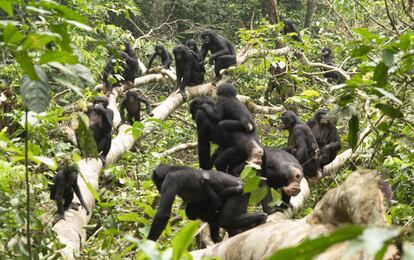Since Jane Goodall discovered with terror the cruel violence that chimpanzees used against their rivals, in authentic wars between factions, many scientists and thinkers saw the diagnosis clearly.
That aggressive gene was in the deepest nature of humans and chimpanzees were something like a wilder version of ourselves.
But that conclusion had at least two problems.
Chimpanzees cannot be read as if they were ancient humans, since they are just cousins that evolved in parallel with their own strategies.
And, above all, that we have other cousins as close as the chimpanzees: the bonobos.
The pacifists, matriarchal, pansexual and generous bonobos.
After meticulously analyzing the behavior of chimpanzees and bonobos in their relationship with individuals from outside groups, a team of scientists has no doubts: the model we should look at, in any case, would be the bonobos.
At least from that point of view, according to primatologist Martin Surbeck: "I think it's fair to say that humans combine characteristics of both species, but in light of their ability to maintain peaceful relationships between groups, humans have a more close to bonobos.”
More information
Sex between bonobas helps them keep the males at bay
Surbeck, from Harvard University, signs with two colleagues a study in the journal
PNAS
in which they openly conclude that we can look at ourselves in the eyes of bonobos: "The tolerance of group relationships observed in bonobos can serve as the building blocks on which intergroup social structures in humans might have evolved."
In this way, the social system of bonobos "may represent a transitional phase of an ancestral state."
Bonobos were among the last large mammals to be described by science because for a long time they were thought to be a reduced version of their cousins: pygmy chimpanzees.
However, his behavior with other individuals, both inside and outside his clan, could not be more different.
Where chimpanzees are hostile and violent, bonobos cooperate with strangers, avoid confrontation, settle their problems with sexual pleasure, and even prefer to share time and resources with individuals outside their clan.
Peaceful encounter between two communities of bonobos. Martin Surbeck
The study compares two communities, that of the Kokolopori bonobos, in the Democratic Republic of the Congo, and the Ngogo chimpanzees, in Uganda, and their numerous encounters with individuals outside the group.
Bonobos share lengthy times and even care: "These prolonged gatherings provide opportunities for interaction, and members of different groups are observed to groom, form coalitions, share food and hunt together."
This context of tolerance would favor cultural transmission, as it happens between humans, according to Surbeck and his colleagues, Liran Samuni (Harvard) and Kevin Langergraber (University of Arizona).
The much more hostile behavior of the chimpanzees can be summed up by the denouement of the Ngogo community: after growing to over a hundred individuals, it split into two factions that fought a bloody
civil war
.
"Given the intense competition between chimpanzee communities and their close relationship with humans, chimpanzees are often used as a model species for the evolution of human warfare," the study explains.
Humans perfectly represent the two versions of their cousins, those who separated from a common ancestor of the three species about six million years ago: the bellicosity of the chimpanzees and the tolerance of the bonobos.
"In light of their ability to maintain peaceful relationships between groups, humans are closer in behavior to bonobos."
Martin Surbeck of Harvard University
By completely turning the tables, the authors of this work go so far as to state that it was the chimpanzees who changed: "It is definitely a theoretical option that chimpanzees lost this ability to cooperate," says Surbeck, who also belongs to the Institute Max Planck of Evolutionary Anthropology.
Traditionally, scientists were in the position of explaining where the cooperation that we observe between innumerable human groups arose, since it was based on the idea that humans were hostile, like chimpanzees.
Thus, as Surbeck explains, monogamy was one of the explanations: Romeo and Juliet get married and have children, who unite their respective families in love for their grandchildren, and from there arose the bonds of union that allowed primitive cooperation between clans.
But this account is watery, judging by this work: we are not the only great apes with this peaceful trait, and we can use bonobos to learn more about the evolutionary forces that allow groups to interact and cooperate with tolerance.
“Now we can be sure that bonobos don't do it because they are paired, and yet we see cooperation between groups... So we can conclude that this is not an evolutionarily necessary element.
It could be that it played a role in humans, but it is not a necessary element, ”says the Harvard primatologist.
You can write to
javier@esmateria.com
, follow
MATERIA
on
,
and
, or sign up to receive
our weekly newsletter
.

